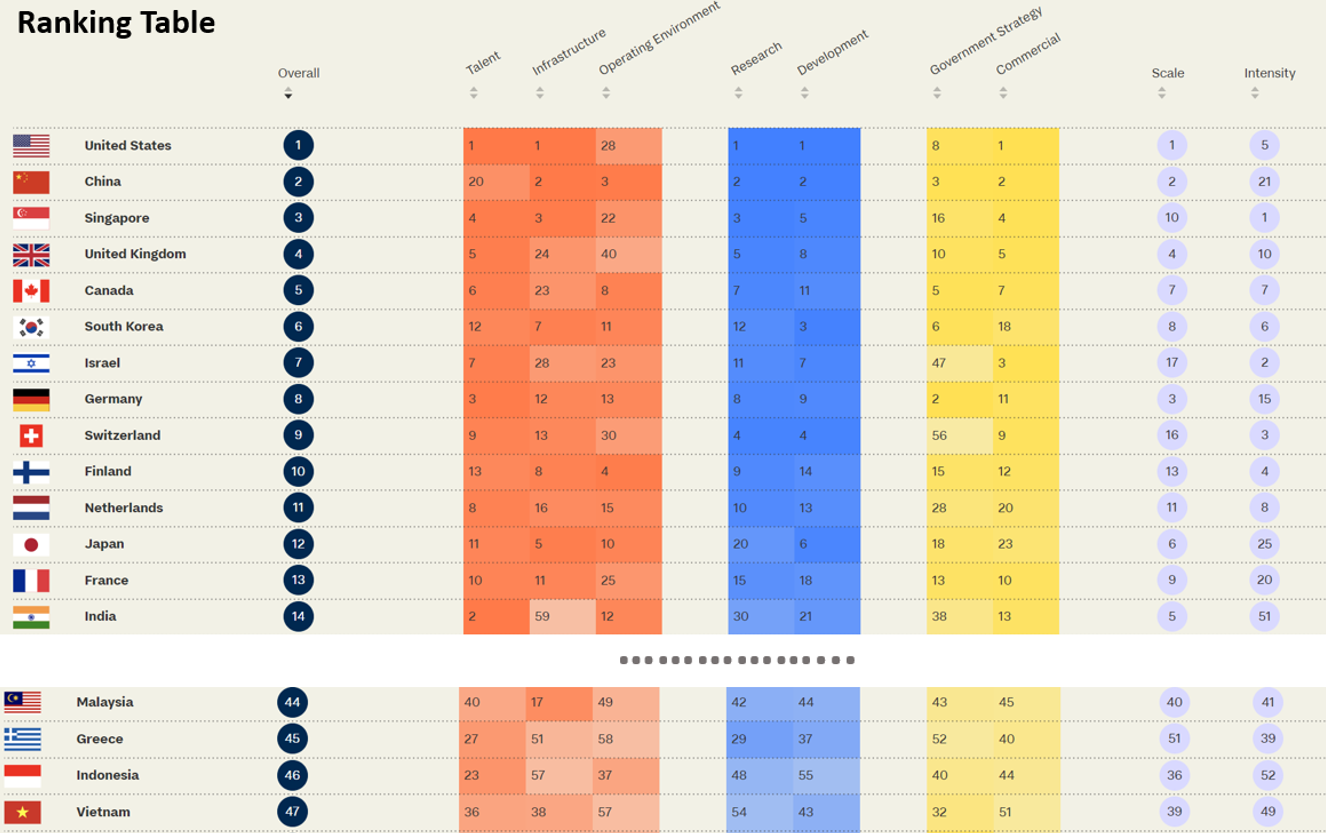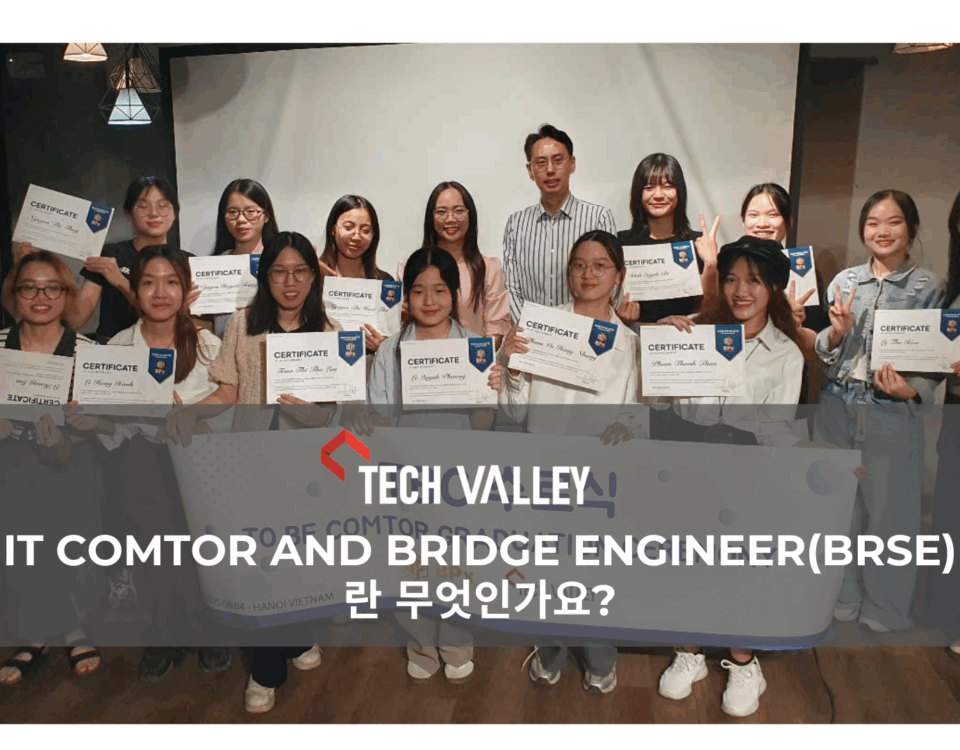
Chiến lược cho các giai đoạn khởi nghiệp được rút ra thông qua quá trình khởi nghiệp ở Việt Nam
2024년 08월 05일
코드프레소, 베트남 호치민 ‘K-TECH JOB FAIR 2024’ 참가
2024년 08월 09일Efforts by Vietnamese government and companies to prepare AI infrastructure
According to the recent 2023 Tortoise Global AI Index survey data, Korea ranked 6th in terms of AI human resources, information, and environment among all 62 countries surveyed. Vietnam was one of the few countries in Southeast Asia to be surveyed, ranking 47th behind Indonesia.

Digital Transformation of Vietnam's IT Market: Past, Present, and Future
Enhancing Vietnam's IT Competitiveness
According to the 2023 Oxford Insight survey, Vietnam ranked 55th out of 182 countries worldwide and 6th among ASEAN countries. This marks a significant transformation from just a few years ago when Vietnam's economy relied heavily on manufacturing, tourism, and agriculture. Now, it is rapidly advancing in the IT sector. The Vietnamese government is boosting its IT competitiveness with various slogans such as "Digital Transformation (DX)" and "Make It Vietnam."
The first-generation model of Vietnam's digital transformation focused on expanding mobile networks (5G) and internet infrastructure across the country. The second generation involved integrating national data and expanding digital finance. Currently, the third-generation model aims to integrate AI, data, and cloud technologies. According to the Prime Minister's Decision 38/2020/QD-TTg, the strategy by 2023 is to nationalize AI research and development, leading to more investments and research in AI-based industries (data centers, cloud computing) and the development of Vietnam-specific ChatGPT and Large Language Models (LLM).
The Vietnamese AI Market Before and After ChatGPT
During the COVID-19 period, there was a surge in interest, development, and advancement in AI within Vietnam. This movement was primarily driven by telecommunications companies (Viettel, VNPT), large corporations (FPT, CMC, VinGroup), and internet unicorns (VNG). The initial products they introduced to the market mainly focused on language and image recognition technologies.
Language recognition began with services like TTS (Text-to-Speech) and STT (Speech-to-Text), evolving into chatbots that played roles as consultants in shopping malls and public institutions. However, it is premature to say that chatbot businesses have become widely socially active in providing satisfactory answers to user queries.
Image recognition AI technology expanded into the CCTV market and eKYC (e-Know Your Customer) technologies, further penetrating the finance, e-commerce, construction, and real estate markets.

The Emergence of Generative AI and Its Impact on the Vietnamese AI Market
Revolutionizing the AI Market with ChatGPT
In 2020, OpenAI's development of ChatGPT brought about revolutionary changes in the AI market. Unlike Amazon Alexa, which provided short, direct answers to questions, ChatGPT could recognize and learn from vast amounts of language and image data across the globe. This capability allowed it to offer advanced conversation analysis and predictive functionalities, thereby forming the foundation of the generative AI market.
The Rise of Generative AI
No matter how advanced AI technology is, its true value is realized only when it is practically applied in business. While Vietnam's existing language recognition (TTS, STT) and chatbot services have sparked interest in AI, there remain doubts about their practical utility.
In contrast, generative AI can utilize text, voice, and images simultaneously in a manner akin to human conversation and online communication through various tools. This technology can provide differentiated services that are more familiar and engaging to users compared to traditional chatbots and call bots. Emerging around the same time as related metaverse technologies, generative AI has evolved into a market for "human-like" services, offering a more sophisticated and interactive experience.
Impact and Future Prospects
The introduction of generative AI in Vietnam has the potential to significantly enhance the practicality and appeal of AI applications. By providing a more human-like interaction, these advanced AI systems can better meet the needs of businesses and consumers alike. As Vietnam continues to invest in and develop AI technologies, the future looks promising for the integration of generative AI into various sectors, driving innovation and growth in the Vietnamese economy.
Duis aute irure dolor in reprehenderit in voluptate velit esse cillum dolore eu fugiat nulla pariatur. Excepteur sint occaecat cupidatat non proident, sunt in culpa qui officia deserunt mollit anim id est laborum.

Trends in Vietnam's Generative AI Market: Vietnam-Specific ChatGPT
Vietnam-Specific ChatGPT
One of the most notable areas in Vietnam's generative AI market is the development of Vietnam-specific GPT models. As of 2024, several prominent examples include PhoGPT, developed by VinAI (a subsidiary of VinGroup), VIGPT, developed by VINBIGDATA, and Zalo AI KILM, launched by Vietnam's internet unicorn, VNG Group.
These companies have introduced Vietnam-specific ChatGPT models that are similar to (or replicate the functionalities of) OpenAI's ChatGPT. By analyzing Vietnamese data and language, they have tailored their ChatGPT models to cater specifically to the local market. This strategic localization allows these AI models to better serve the needs and preferences of Vietnamese users, enhancing their relevance and usability in various applications.
These developments highlight the rapid advancement and potential of Vietnam's generative AI market, positioning the country as a significant player in the AI industry in Southeast Asia.

Virtual Characters (Meta Humans) in Vietnam: A New Era of Digital Interaction
The Rise of Virtual Characters in Vietnam
In August 2021, Vietnam's Creatory launched Vi Sense, the country's first virtual model and idol. At the time, producing content using 3D technology was not only costly but also presented challenges in achieving a return on investment (ROI) in a market like Vietnam.
The Evolution to AI-Driven Virtual Idols
After 2023, Creatory leveraged AI technology and Web3 community tools to debut a new virtual idol named Eve Linh. Eve Linh is characterized by her development through a deep learning process, synthesizing images of thousands of Vietnamese beauties to create a face that doesn't exist in reality but is universally appealing.
Eve Linh's development mirrors the AI model Sora, created by OpenAI in February 2024. Both models exemplify how AI can be utilized to craft virtual personas that resonate widely with audiences, combining aesthetic appeal with advanced AI capabilities.
Implications for the Future
The emergence of virtual characters like Eve Linh signals a new era in digital interaction, where AI and deep learning create highly engaging and relatable virtual idols. This advancement not only transforms the entertainment industry but also opens up new opportunities for marketing, customer engagement, and digital experiences in Vietnam and beyond. As AI technology continues to evolve, the potential applications for virtual characters will likely expand, further integrating them into our daily digital lives.

The Vietnamese Meta Human Linh is expected to be used in various entertainment fields, such as advertising models, TV shopping mall hosts, movies, broadcasting, and games, similar to examples in Korea.
Vietnam’s First News Virtual Anchor In July 2021, Vietnam's Lao Dong TV officially started daily TV news and breaking news through Vietnam’s first AI-based news anchor. Although it was a pilot project and is not yet officially in service, this virtual anchor can provide real-time news videos in multiple languages when given a script that is updated dozens of times a day.

AI technology is no longer a ‘future’ technology but is becoming a ‘present’ technology and a ‘practical technology’ that impacts our daily lives rather than just a marketing keyword.
Considering Vietnam's young IT workforce, rapid imitation and learning of technology, and the speed at which new technologies are adopted, I believe Vietnam can enhance its national competitiveness in AI and quickly move up from its current position in the global AI index, which is around the 40th place.
Vietnam IT 블로거, TechValley Vietnam 대표
📧 기술 문의 : patrick@techvalley.biz | 💬 go2hanoi (카카오톡) @patrickdykim (Telegram)





